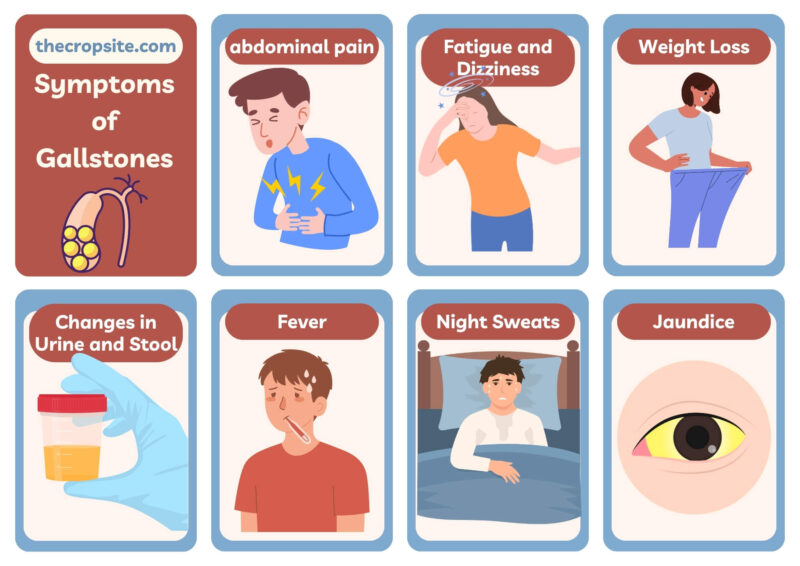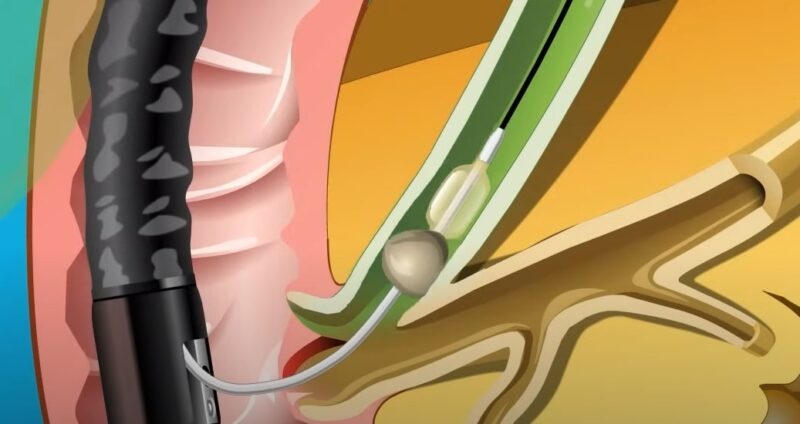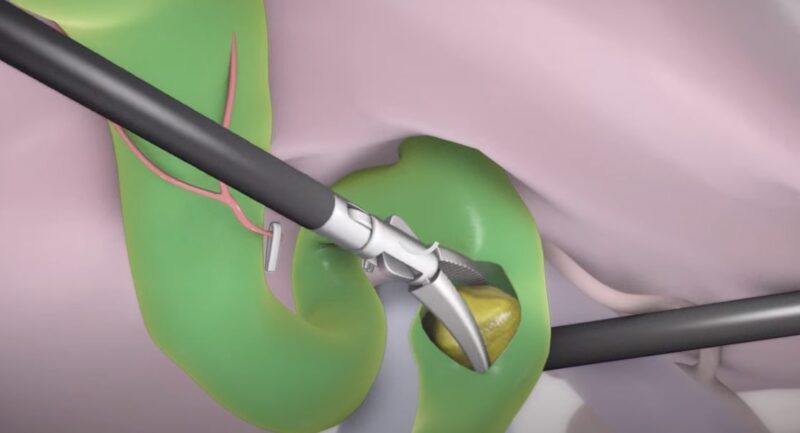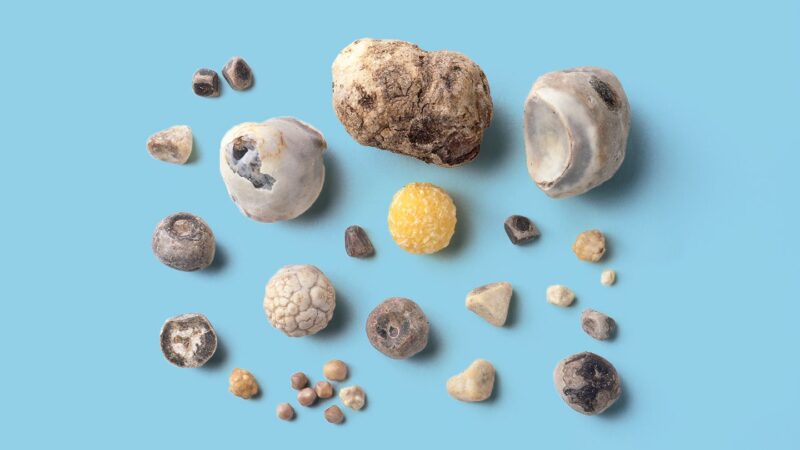Despite its importance in the human body, the gallbladder often doesn’t receive much attention until problems arise.
This small organ’s primary function is to store bile juice, which is crucial for breaking down fats in the digestive system.
Issues occur when the bile ducts become blocked or when bile juice crystallizes, leading to the formation of gallstones.
The crystallization process causes gallstones to form inside, which will be discussed in detail in this article.
Symptoms And Treatment Of Gallstones
Gallstones can manifest with a variety of symptoms, some of which may be surprising or easily overlooked.
Understanding these symptoms is crucial for early detection and treatment.
Major Symptoms

The primary symptom of gallstones is severe abdominal pain, often described as sharp and intense.
This pain typically occurs in the upper right quadrant of the abdomen, right below the ribcage.
The duration and intensity of this pain can vary significantly between individuals.
For some, the pain may last only 30 minutes, while for others, it can persist for several hours.
When gallstones block the bile ducts, additional symptoms can develop.
This blockage can cause bile to build up in the gallbladder, leading to inflammation and infection.
Symptoms of a severe blockage include:
- Fatigue and Dizziness: These symptoms can become more pronounced as the gallstone size increases and the blockage worsens.
- Loss of Appetite and Weight Loss: Due to ongoing digestive issues and discomfort, patients may lose their appetite, leading to significant weight loss.
- Changes in Urine and Stool: Urine may appear darker, while stools can become lighter in color and greasy in texture.
- Fever and Chills: Severe cases may present with fever and chills, indicating a possible infection.
- Night Sweats: Patients may experience extreme sweating at night.
- Jaundice: When bile flow is obstructed for a prolonged period, jaundice can occur, leading to yellowing of the skin and eyes.
- Itching: Some patients may experience itching, which is another sign of bile accumulation in the body.
The combination of these symptoms, especially if they are persistent and unexplained, warrants a detailed medical evaluation. Early diagnosis can prevent complications and improve outcomes.
Diagnosis and Treatment
If you experience unexplained tiredness and dizziness, consult a healthcare provider for a thorough evaluation. Diagnosis often involves imaging tests like ultrasound or CT scans to visualize the gallstones and assess their impact on bile flow.
Treatment Options

- Non-Surgical Treatments: For asymptomatic gallstones or mild cases, doctors may recommend monitoring and managing symptoms through dietary changes and medications that dissolve gallstones.
- Endoscopic Retrograde Cholangiopancreatography (ERCP): This procedure is used for both diagnosing and treating gallstones. It involves using an endoscope to locate and remove gallstones blocking the bile ducts.
Special Considerations:
- During Pregnancy: Surgical treatments are generally avoided due to potential risks. Non-surgical options and careful monitoring are preferred.
- Cancer Survivors: Individuals who have survived pancreatic or gallbladder cancer are at higher risk for gallstones and should take preventive measures as advised by their doctors.
- Gallbladder Polyps: Not all polyps are cancerous, but clinical examination is necessary to understand their nature and decide on appropriate treatment.
Now, let us talk about the most common treatment methodologies adopted in such cases.
Diagnosis and Immediate Treatment with ERCP
If your doctor suspects you have gallstones, an immediate diagnostic and therapeutic procedure known as Endoscopic Retrograde Cholangiopancreatography (ERCP) may be performed.
This procedure involves the use of an endoscope and X-rays to locate and remove gallstones that are causing blockages in the bile ducts.
ERCP not only helps in diagnosing the presence of gallstones but also provides a minimally invasive treatment option to alleviate the obstruction and related symptoms.
Treatment for Gallbladder Cancer
In cases where gallstones are linked to gallbladder cancer, the treatment approach becomes more complex.
Oncologists may consider popular cancer treatments such as chemotherapy and radiation therapy.
Chemotherapy involves the use of drugs to kill or slow the growth of cancer cells, while radiation therapy uses high-energy rays to target and destroy cancerous tissues.
These treatments aim to control the spread of cancer and manage symptoms, providing a comprehensive approach to cancer care.
Considerations During Pregnancy
Treating gallstones during pregnancy requires special considerations due to the potential risks to both the mother and the unborn child.
Surgical interventions are generally avoided to prevent complications that may arise from anesthesia and surgery.
Instead, doctors may focus on managing symptoms through dietary changes, pain management, and monitoring.
In some cases, non-surgical procedures like ERCP can be safely performed during pregnancy if deemed necessary.
Laparoscopy and Cholecystectomy

For many patients, surgical removal of gallstones is the most effective treatment.
The two main surgical procedures are laparoscopy and cholecystectomy.
Laparoscopy is a minimally invasive surgery that uses small incisions and a laparoscope (a thin tube with a camera) to remove gallstones.
Cholecystectomy involves the removal of the gallbladder itself and can be performed either laparoscopically or through open surgery.
This procedure is often recommended when gallstones cause recurrent problems or complications such as inflammation or infection.
Importance of Timely Medical Intervention
Given the availability of effective treatments for gallstones, it is crucial to seek medical attention as soon as you experience symptoms or are diagnosed with the condition.
Early intervention can prevent complications, alleviate symptoms, and improve overall outcomes.
Whether through non-invasive procedures, surgical options, or cancer treatments, timely medical care is essential for managing gallstone-related issues effectively and ensuring a swift recovery.
Related Posts:
- Why Stiff Muscles Are Often Overlooked as a Cause of…
- Elephant Ear Plant Leaves Turning Yellow - Causes &…
- What Causes White Spots on Cucumber Leaves and How…
- Can A Vitamin Deficiency Contribute To The Formation…
- How Organic Food Can Prevent Common Oral Health Issues
- How Can Body Get Rid of Titanium Dioxide?









